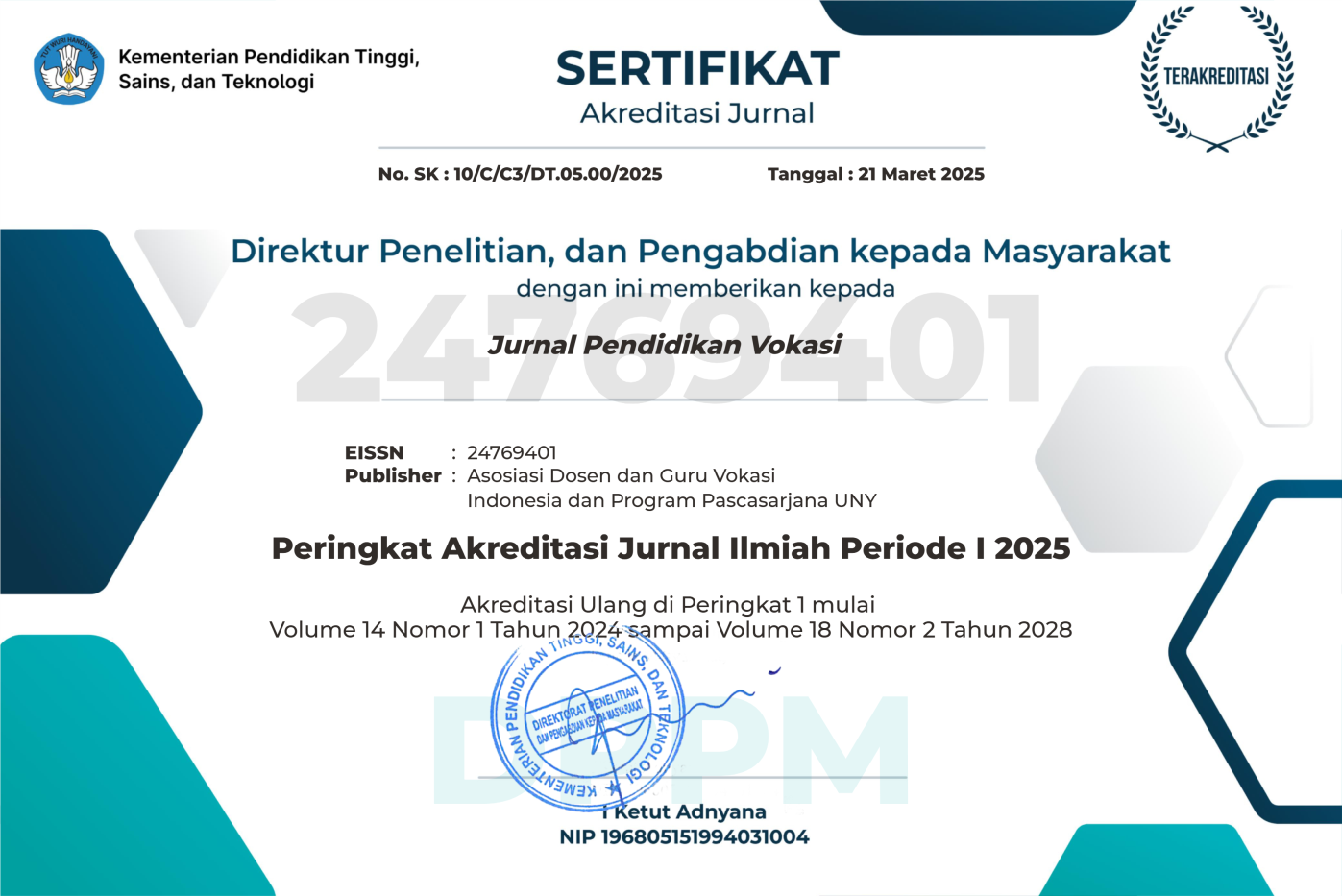The benefit of running maintenance habituation before learning of machining process begins
DOI:
https://doi.org/10.21831/jpv.v11i3.44018Keywords:
Classroom action research, learning practices, running maintenance, teaching learningAbstract
References
Asiabaka, I. P. (2008). The need for effective facility management in schools in Nigeria. New York Science Journal, 1(2), 10–21. http://www.sciencepub.net/newyork/0102/02_0366_Asiabaka_FACILITIES.pdf
Dhillon, B. S. (2002). Engineering maintenance: a modern approach. CRC Press. https://books.google.com/books?hl=en&lr=&id=vfHKBQAAQBAJ&oi=fnd&pg=PP1&dq=Engineering+maintenance:+A+Modern+approach&ots=6uwiqy4iYj&sig=_hYDJOHuWX2BFqFKE-Y7xGcJhz8
Ekpoh, U. I. (2018). School plant maintenance culture and utilization. In N. P. Ololube (Ed.), Handbook of Research on Educational Planning and Policy Analysis (pp. 138–155). Pearl Publishers. https://www.researchgate.net/profile/Uduak-Ekpoh-2/publication/332803962_School_Plant_Maintenance_Culture_and_Utilization/links/5ccae6ea92851c8d22146cb2/School-Plant-Maintenance-Culture-and-Utilization.pdf
Firdaus, N., Samat, H. A., & Mohamad, N. (2019). Maintenance for energy efficiency: a review. IOP Conference Series: Materials Science and Engineering, 530(1), 1–15. https://doi.org/10.1088/1757-899X/530/1/012047
Gackowiec, P. (2019). General overview of maintenance strategies–concepts and approaches. Multidisciplinary Aspects of Production Engineering, 2(1), 126–139. https://doi.org/10.2478/mape-2019-0013
Gandhare, B. S., & Akarte, M. (2012). Maintenance strategy selection. Ninth AIMS International Conference on Management, January, 1330–1336. https://www.researchgate.net/profile/Balasaheb-Gandhare/publication/267298504_Maintenance_Strategy_Selection/links/571ee43708aeaced7889e9ec/Maintenance-Strategy-Selection.pdf
Garg, H. P., & Gupta, B. P. (1987). Industrial maintenance. S. Chand Limited. https://www.google.co.id/books/edition/Industrial_Maintenance/Hh9gPQAACAAJ?hl=en
Goyal, R. K., & Maheshwari, K. (2012). Maintenance management practices: a retrospective and literature review. International Journal of Advances in Engineering Research, 3(2), 49–66. https://ijaer.com/admin/upload/06 Feb_2012_Ravi Kumar Goyal.pdf
Hantoro, S., & Sukardi, T. (1990). Teknologi pemeliharaan mesin perkakas (1st ed.). Liberty. https://opac.perpusnas.go.id/DetailOpac.aspx?id=20018
Hardt, F., Kotyrba, M., Volna, E., & Jarusek, R. (2021). Innovative approach to preventive maintenance of production equipment based on a modified TPM methodology for industry 4.0. Applied Sciences, 11(15), 6953. https://doi.org/10.3390/app11156953
Pophaley, M., & Vyas, R. K. (2010). Plant maintenance management practices in automobile industries: a retrospective and literature review. International Journal of Advances in Engineering Research, 3(3), 512–541. https://doi.org/http://dx.doi.org/10.3926/jiem.v3n3.p512-541
Prokopenko, J., & North, K. (1996). Productivity and quality management: a modular programme. International Labour Office. https://books.google.co.id/books?id=dw%5C_CtAEACAAJ
Shanmugam, A., & Robert, T. P. (2015). Human factors engineering in aircraft maintenance: a review. Journal of Quality in Maintenance Engineering, 21(4), 478–505. https://doi.org/10.1108/JQME-05-2013-0030
Sheikhalishahi, M., Pintelon, L., & Azadeh, A. (2016). Human factors in maintenance: a review. Journal of Quality in Maintenance Engineering, 22(3), 218–237. https://doi.org/10.1108/JQME-12-2015-0064
Subiyono. (1993). Manajemen Perawatan. Polman.
Sukardi, T., Marwanto, A., & Ngadiyono, Y. (2013). Pengembangan model running maintenance pada proses pemesinan di Jurusan Mesin SMK Rumpun Teknologi se–DIY. https://eprints.uny.ac.id/22708/1/LAPORAN AKHIR BURNING , THOMAS.pdf
Downloads
Published
How to Cite
Issue
Section
Citation Check
License
The authors submitting a manuscript to this journal agree that, if accepted for publication, copyright publishing of the submission shall be assigned to Jurnal Pendidikan Vokasi. However, even though the journal asks for a copyright transfer, the authors retain (or are granted back) significant scholarly rights.
The copyright transfer agreement form can be downloaded here: [JPV Copyright Transfer Agreement Form]
The copyright form should be signed originally and sent to the Editorial Office through email to jpvokasi@uny.ac.id
Jurnal Pendidikan Vokasi by http://journal.uny.ac.id/index.php/jpv is licensed under a Creative Commons Attribution-ShareAlike 4.0 International License.













